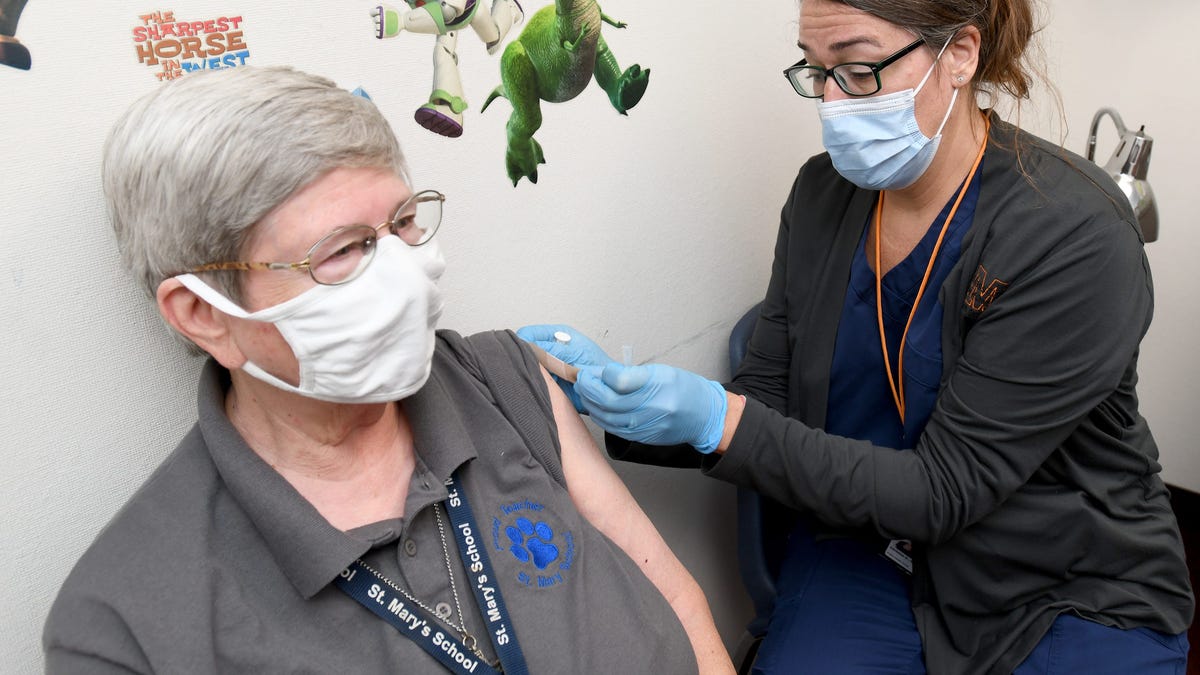COVID-19 booster shots are now available to all adults in the U.S.
Friday morning, the Food and Drug Administration authorized booster doses for any adult, lifting restrictions that had been imposed last month.
Later in the day, a panel of independent experts voted unanimously to support boosters for all and to particularly encourage people over 50 to get them after reviewing safety data and information about the benefit they provide. CDC Director Rochelle Walensky quickly signed off on the shots.
The decision means all adults who received either the Pfizer-BioNTech or the Moderna vaccines at least six months ago are now eligible for a third dose. People who received the vaccine from Johnson & Johnson more than two months ago were already eligible for boosters.

The Biden administration has purchased enough vaccine to provide boosters at no cost, and pharmacies should have doses available immediately.
Boosters have been allowed for certain groups for about a month, though so far only about 17% of all adults and 37% of those 65 and older have gotten them. Some states also have already authorized boosters for all, including California, Louisiana, Kansas, Kentucky and Massachusetts.
Vaccine experts say there’s little downside to getting a booster dose; side effects are comparable to the initial round of shots.
Protection from vaccines starts to fade at about six months, data shows. The same people who are vulnerable to severe COVID-19 – those over 65 or with certain medical conditions such as diabetes or lung disease – are also more vulnerable to so-called breakthrough infections.
Here is what you should know about boosters:
Who should get a booster shot?
Anyone who received their first two doses of Moderna or Pfizer-BioNTech vaccine at least six months ago is now eligible for a third dose. Anyone who got a single-dose Johnson & Johnson vaccine at least two months ago can get a second shot.
Which shot is best?
The Pfizer-BioNTech and Moderna vaccines are very similar, and the government has said that mixing vaccine brands is fine – so it’s not a problem to get a Pfizer-BioNTech booster after one of the other two, for example. J&J recipients may get better protection by switching vaccines for their second dose, data shows.
Why bother to get a booster?
Studies show that vaccine effectiveness against symptomatic disease begins to fade about six months after initial shots. A booster dose bumps protection levels back up to or even higher than initial vaccination.
Booster shots are also likely to reduce transmission of the virus, which could help bring down or at least limit the spread of the virus.
Will shots offer protection in time for the holidays?
COVID-19 vaccines take about a week to start making a difference, studies show. So, while it’s probably too late to get protection in time for a big Thanksgiving celebration, getting a shot in the next few weeks will provide extra protection for Christmas and New Year’s.
What about the risks?
There don’t appear to be any additional risks from a third shot compared to earlier doses. Side effects are similar, and no new types of symptoms have been reported after boosters.
The only potential side effect that concerns experts is a swelling of the heart, called myocarditis, which happens rarely but most often in adolescent and young men. Myocarditis is usually short-lived and mild after vaccination but can be more serious when it results from coronavirus infection, research shows.
Are boosters the same as initial doses?
Pfizer-BioNTech and J&J boosters are the same as initial shots. Moderna’s booster is half the dose of its initial shots, which the company found provided just as much protection with fewer side effects.
Do boosters help people who’ve already been infected and vaccinated?
Studies have not looked specifically at the benefit of boosters to people who have already been both infected and vaccinated. In general, the combination of infection plus vaccination has been shown to be more protective than either alone, though protection from vaccination is more consistent and predictable.
Don’t people elsewhere in the world need shots more?
Yes; many countries don’t have enough vaccines to protect even their most vulnerable residents. The U.S. government has committed to donating hundreds of millions of vaccine doses around the world, though most have yet to arrive because the U.S. prioritized providing doses to Americans. Vaccine doses for Americans come from a different pool and are likely to expire if they are not used fairly soon. So skipping a booster will not help someone elsewhere even though they may need a shot more.
Will people need more boosters after this one?
It’s not clear whether a third dose will be enough to protect indefinitely against COVID-19 or whether additional or annual doses will be needed. It will depend in part on how the immune system responds to a third dose, as well as how much virus is circulating and whether other variants emerge that are different enough to weaken existing protection.
Contact Karen Weintraub at kweintraub@usatoday.com and Elizabeth Weise at eweise@usatoday.com.
Health and patient safety coverage at USA TODAY is made possible in part by a grant from the Masimo Foundation for Ethics, Innovation and Competition in Healthcare. The Masimo Foundation does not provide editorial input.
